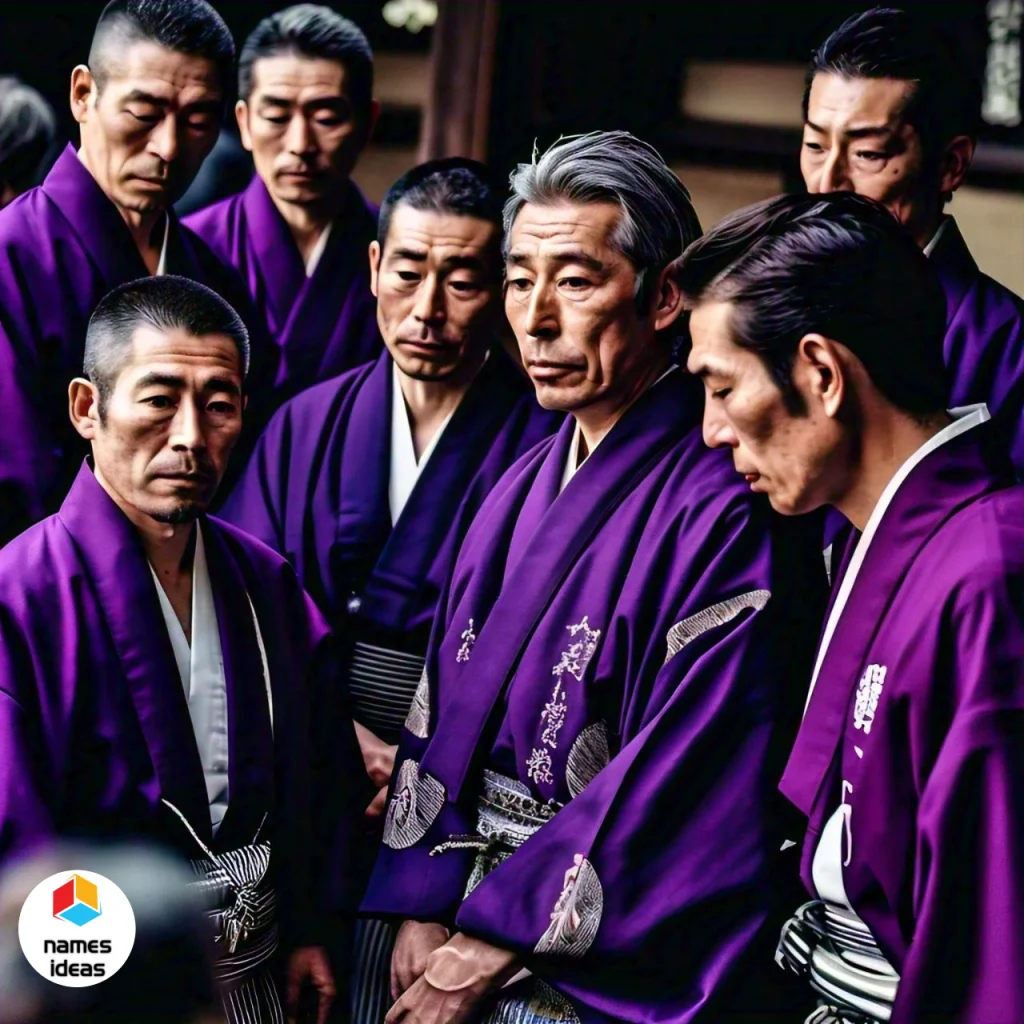Japanese names that mean purple are a beautiful, vibrant way to add a touch of elegance and meaning to a name. In Japan, people often link the color purple with royalty, spirituality, and sophistication. Choosing a name that represents this rich color can give your child’s name a special significance.
Japanese Names That Mean Purple: Beautiful Options
Japanese names that mean purple often embody a sense of elegance and nobility, reflecting the color’s rich symbolism.
These names can range from traditional choices to modern picks, each carrying its own unique significance.
Japanese Names That Mean Purple
- Murasaki (紫) – Directly means “purple” and is a traditional Japanese name.
- Sumire (菫) – Means “violet,” a flower with a purple color.
- Asagi (浅葱) – Refers to a light shade of blue-green, but can be associated with a purple hue in some contexts.
- Akira (明) – Can mean “bright” or “clear,” and in some contexts, it’s linked with purple tones.
- Aoi (葵) – Means “hollyhock” or “blue,” but can also be associated with a shade of purple.
- Kirin (麒麟) – While primarily known as “unicorn,” the name has mythological connections that sometimes link to purple.
- Fujiko (藤子) – Means “wisteria child,” referencing the purple wisteria flower.
- Ruri (瑠璃) – Means “lapis lazuli,” a deep blue stone often associated with purple shades.
- Shion (紫苑) – Means “aster,” a flower that can come in purple.
- Sakura (桜) – While it primarily means “cherry blossom,” the name can be associated with various colors, including purple hues.
- Yuri (百合) – Means “lily,” and although lilies are generally white, there are purple varieties.
- Natsuki (夏希) – Can mean “summer hope,” and purple summer flowers are sometimes associated with it.
- Miyabi (雅) – Means “elegance” and can be associated with the elegance of purple.
- Rika (理香) – Can be linked to the fragrance of purple flowers.
- Niko (日子) – While meaning “sun child,” it can be indirectly associated with the warmth of purple tones.
- Hanae (花江) – Means “flower river,” referencing the beauty of flowers including purple ones.
- Kiko (紀子) – Means “child of the chronicle,” with purple flowers often symbolizing memory and history.
- Hiroko (宏子) – Means “child of vastness,” and purple often signifies vastness in terms of depth.
- Tsubaki (椿) – Means “camellia,” which can come in purple shades.
- Atsuko (敦子) – Means “child of earnestness,” associated with the depth of purple.
These names include both traditional and modern options, reflecting the diverse ways people incorporate purple into Japanese naming practices.
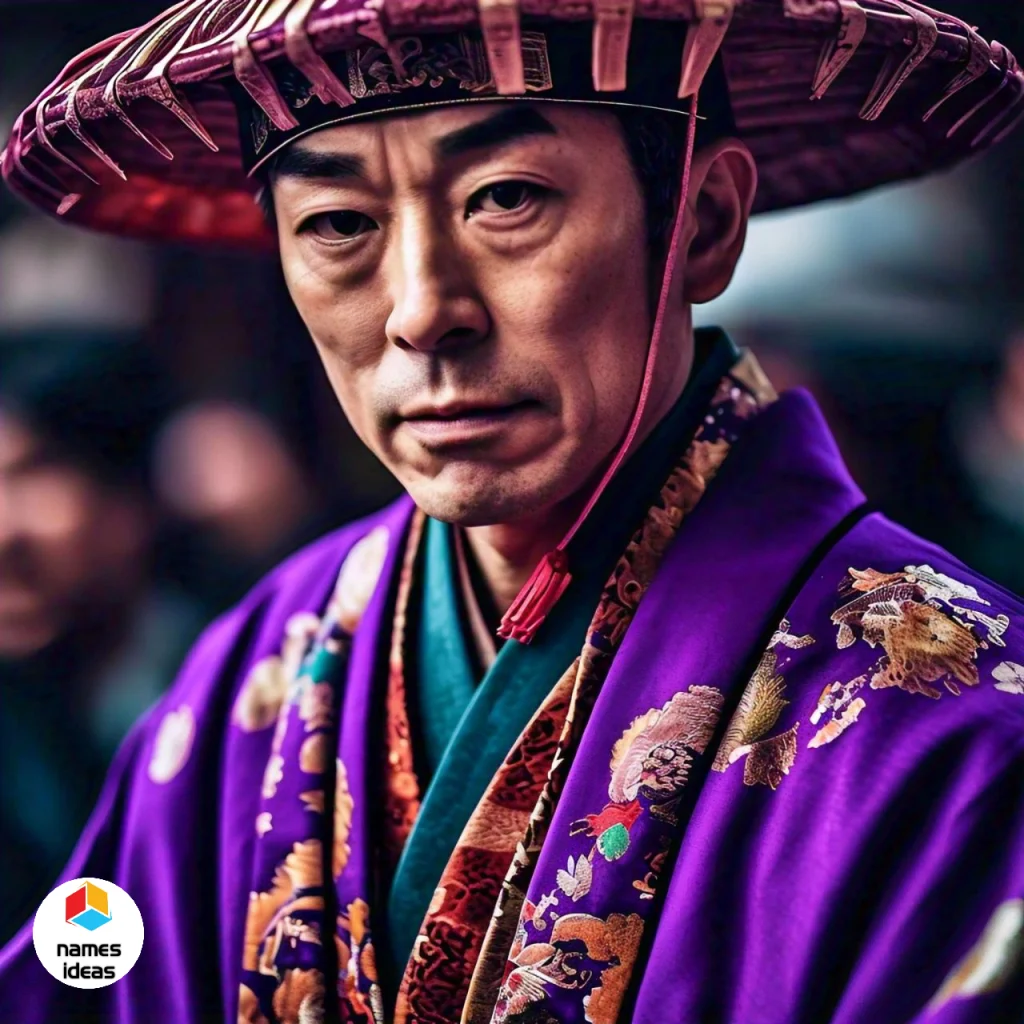
Japanese Boy Names That Mean Purple
- Murasaki (紫) – Directly means “purple” and is a traditional Japanese name.
- Sumire (菫) – While typically a girl’s name meaning “violet,” it can be used for boys as well.
- Fujin (藤人) – Means “wisteria person,” inspired by the purple wisteria flower.
- Asagi (浅葱) – Refers to a light shade of blue-green but is sometimes associated with purple tones.
- Aoi (葵) – Means “hollyhock” or “blue,” and can be linked with purple in certain contexts.
- Kirin (麒麟) – Known as “unicorn” in mythology, sometimes linked to purple in symbolic contexts.
- Ruri (瑠璃) – Means “lapis lazuli,” a deep blue stone that can have purple hues.
- Shion (紫苑) – Means “aster,” a flower that can be purple.
- Seiji (青紫) – Means “blue-purple,” directly incorporating purple.
- Rikuto (理人) – Can mean “reason person,” with an indirect connection to purple through meaning.
- Taichi (大地) – Means “great earth,” and can be associated with the richness of purple tones.
- Sora (空) – Means “sky,” and purple is often seen in twilight skies.
- Hikaru (光) – Means “light” or “radiance,” with purple sometimes symbolizing radiant beauty.
- Tsubasa (翼) – Means “wings,” and purple is sometimes associated with the elegance of flight.
- Kaito (海斗) – Means “ocean,” and can be associated with deep purple hues of the sea.
- Yuki (雪) – Means “snow,” with a subtle association with the purity and depth of purple.
- Sosuke (創介) – Means “creative help,” with purple symbolizing creativity.
- Akihiko (明彦) – Means “bright prince,” with purple associated with royalty and nobility.
- Ren (蓮) – Means “lotus,” and some lotus flowers can be purple.
- Ryo (涼) – Means “cool” or “refreshing,” with purple often symbolizing cool and calming hues.
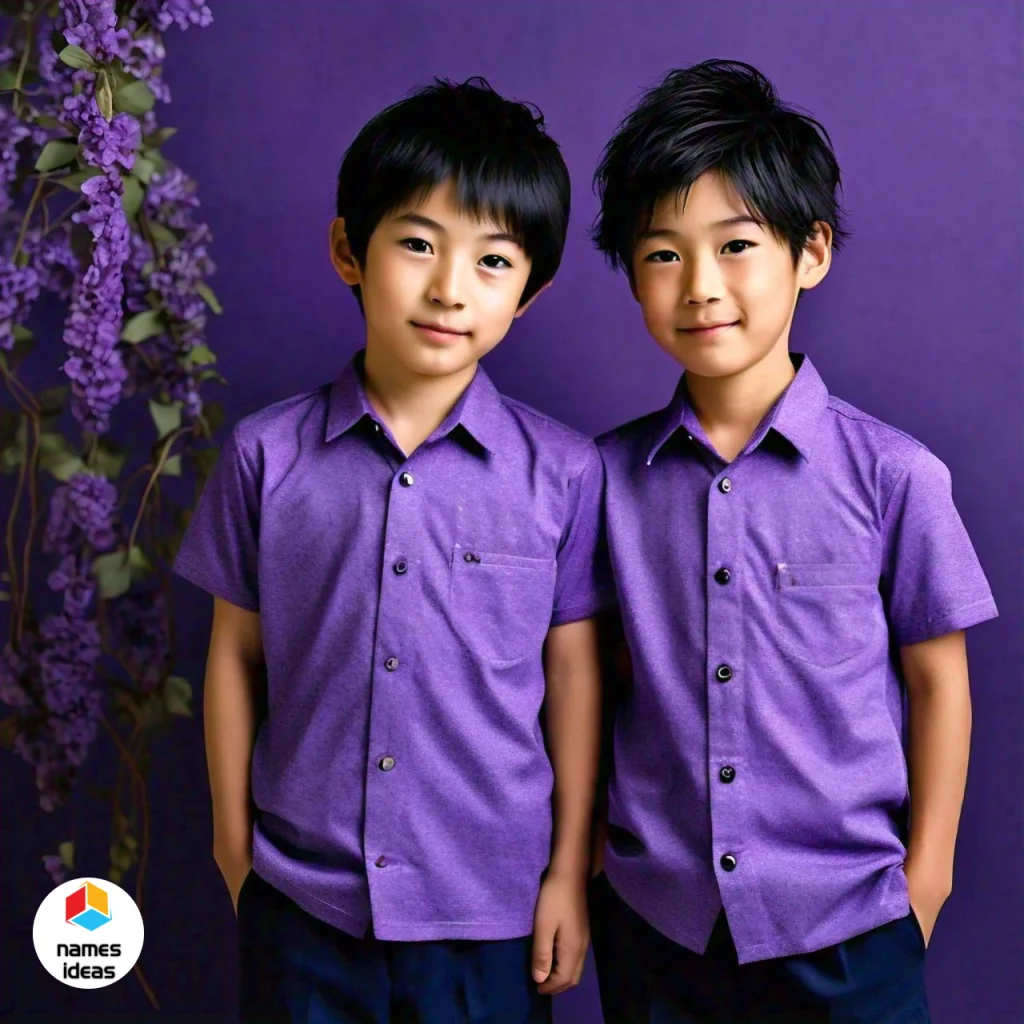
These names reflect the diverse ways people incorporate purple and related concepts into Japanese boy names.
Japanese Girl Names That Mean Purple
- Murasaki (紫) – Directly means “purple” and is a traditional Japanese name.
- Sumire (菫) – Means “violet,” a flower known for its purple color.
- Shion (紫苑) – Means “aster,” a flower that can be purple.
- Fujiko (藤子) – Means “wisteria child,” inspired by the purple wisteria flower.
- Aoi (葵) – Means “hollyhock” or “blue,” and can also be linked with purple tones.
- Ruri (瑠璃) – Means “lapis lazuli,” a deep blue stone with purple hues.
- Asagi (浅葱) – Refers to a light shade of blue-green, sometimes associated with purple.
- Himawari (向日葵) – Means “sunflower,” which can come in purple varieties.
- Sakura (桜) – Means “cherry blossom,” and some varieties have purple tones.
- Yuri (百合) – Means “lily,” which can be purple.
- Aoi (葵) – Means “hollyhock” and can be connected with purple in some contexts.
- Miyuki (美幸) – Means “beautiful happiness,” with purple symbolizing luxury and joy.
- Miyabi (雅) – Means “elegance,” and purple is often associated with elegance.
- Rika (理香) – Linked to the fragrance of purple flowers.
- Hanae (花江) – Means “flower river,” with purple flowers often symbolizing beauty.
- Shizuka (静) – Means “quiet” or “calm,” qualities associated with the serenity of purple.
- Satsuki (五月) – Means “May,” a month when many purple flowers bloom.
- Natsuki (夏希) – Means “summer hope,” and purple summer flowers can be associated.
- Emi (恵美) – Means “blessed beauty,” with purple often considered a color of blessings.
- Akemi (明美) – Means “bright beauty,” and purple is linked with both brightness and beauty.
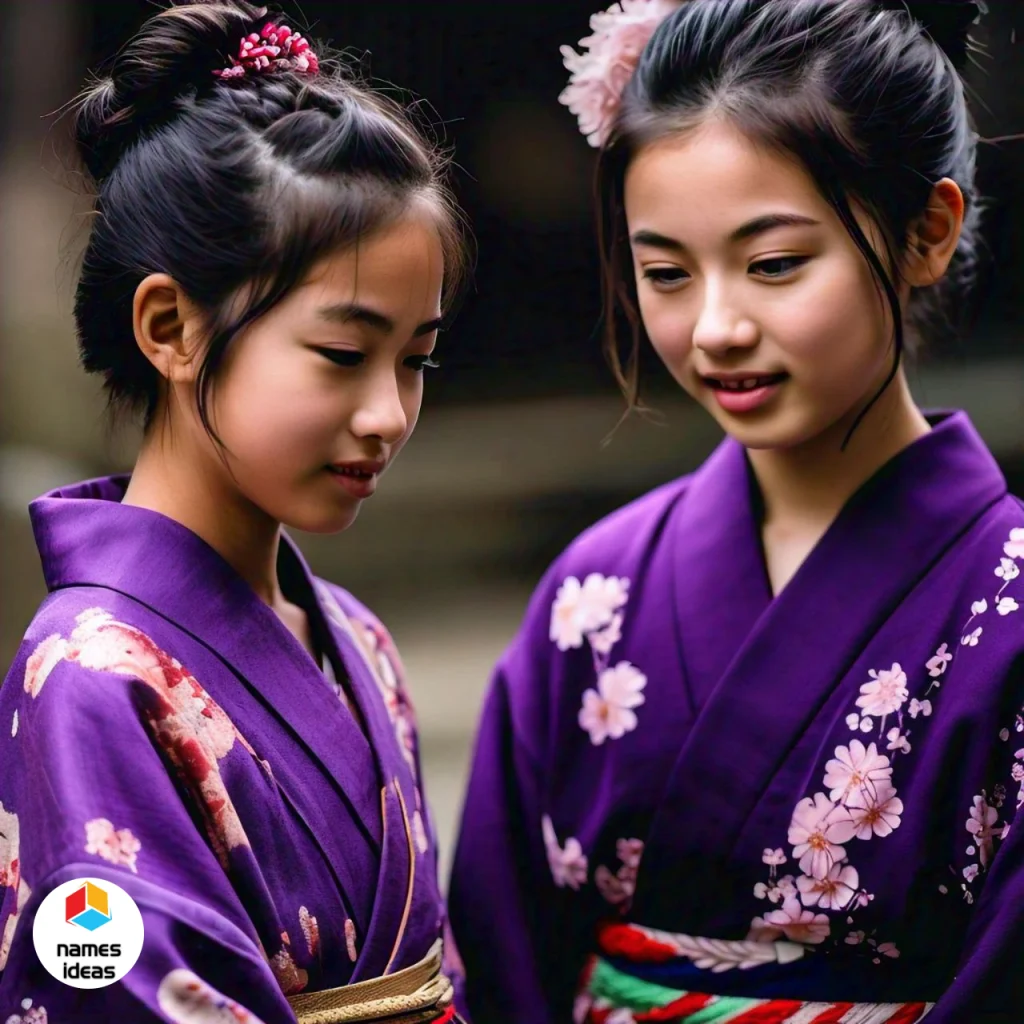
These names incorporate the essence of purple and its symbolic meanings, offering a range of traditional and modern options for girls.
Japanese Baby Names That Mean Purple
- Murasaki (紫) – Directly means “purple” and is a traditional name.
- Sumire (菫) – Means “violet,” a flower known for its purple color.
- Shion (紫苑) – Means “aster,” a flower that can be purple.
- Fujiko (藤子) – Means “wisteria child,” inspired by the purple wisteria flower.
- Asagi (浅葱) – Refers to a light shade of blue-green, sometimes associated with purple.
- Aoi (葵) – Means “hollyhock” or “blue,” and can also be linked with purple hues.
- Ruri (瑠璃) – Means “lapis lazuli,” a deep blue stone with purple tones.
- Himawari (向日葵) – Means “sunflower,” which can come in purple varieties.
- Yuri (百合) – Means “lily,” which can be purple.
- Rika (理香) – Linked to the fragrance of purple flowers.
- Hanae (花江) – Means “flower river,” with purple flowers often symbolizing beauty.
- Shizuka (静) – Means “quiet” or “calm,” qualities associated with the serenity of purple.
- Satsuki (五月) – Means “May,” a month when many purple flowers bloom.
- Natsuki (夏希) – Means “summer hope,” and purple summer flowers can be associated.
- Emi (恵美) – Means “blessed beauty,” with purple often considered a color of blessings.
- Akemi (明美) – Means “bright beauty,” and purple is linked with both brightness and beauty.
- Rei (麗) – Means “lovely,” and purple is associated with beauty and charm.
- Yoshiko (佳子) – Means “child of beauty,” and purple is considered a beautiful color.
- Kiku (菊) – Means “chrysanthemum,” a flower that can be purple.
- Nana (七) – Means “seven,” and purple is often associated with spirituality and depth.
- Keiko (恵子) – Means “child of grace,” with purple symbolizing gracefulness.
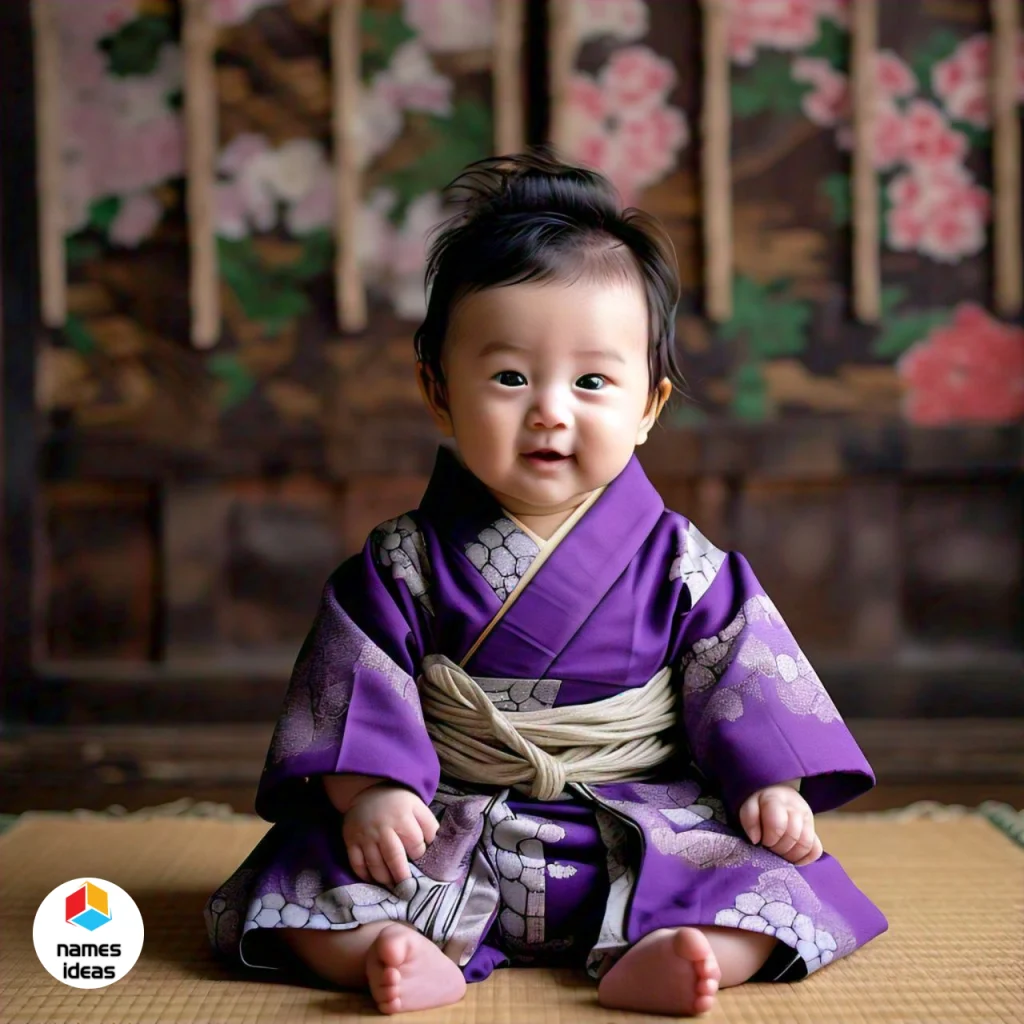
These names reflect a range of associations with purple, from direct meanings to symbolic connections, offering a diverse selection for Japanese baby names.
Japanese Last Names That Mean Purple
- Murasaki (紫) – Directly means “purple.”
- Fujimoto (藤本) – Contains “藤” (wisteria), a flower associated with purple.
- Fujita (藤田) – Similar to Fujimoto, linked with “藤” (wisteria).
- Shiono (紫苑) – Uses “紫苑,” meaning “aster,” a flower that can be purple.
- Aoi (青井) – While it primarily means “blue,” it can be linked with purple in some contexts.
- Takano (高野) – Contains “高” (high), symbolizing the elevated status often associated with the color purple.
- Kishida (岸田) – Although not directly related, “岸” (shore) and “田” (field) can symbolize beauty often linked with purple landscapes.
- Miyazaki (宮崎) – Contains “宮” (shrine), and shrines are often adorned with purple items.
- Miyamoto (宮本) – Similar to Miyazaki, linking indirectly through traditional associations with purple in Japanese culture.
- Yamamoto (山本) – Contains “山” (mountain), where wild purple flowers may grow.
- Saito (斎藤) – Contains “斎” (purify), and the purification rituals sometimes involve the color purple.
- Shimizu (清水) – Means “clear water,” and purple is sometimes associated with clarity and depth.
- Ono (小野) – Means “small field,” where purple flowers can be found.
- Nakamura (中村) – Means “central village,” with traditional ties to color symbolism.
- Sakamoto (坂本) – Contains “坂” (slope), where purple flowers might grow.
- Kaneko (金子) – Means “child of gold,” and purple is often associated with wealth.
- Matsumoto (松本) – Contains “松” (pine), with purple flowers sometimes growing around pines.
- Takahashi (高橋) – Contains “高” (high), symbolizing the elevated status linked with purple.
- Kondo (近藤) – Means “near wisteria,” indirectly relating to the purple flower.
- Sugimoto (杉本) – Contains “杉” (cedar), where purple flowers may grow.
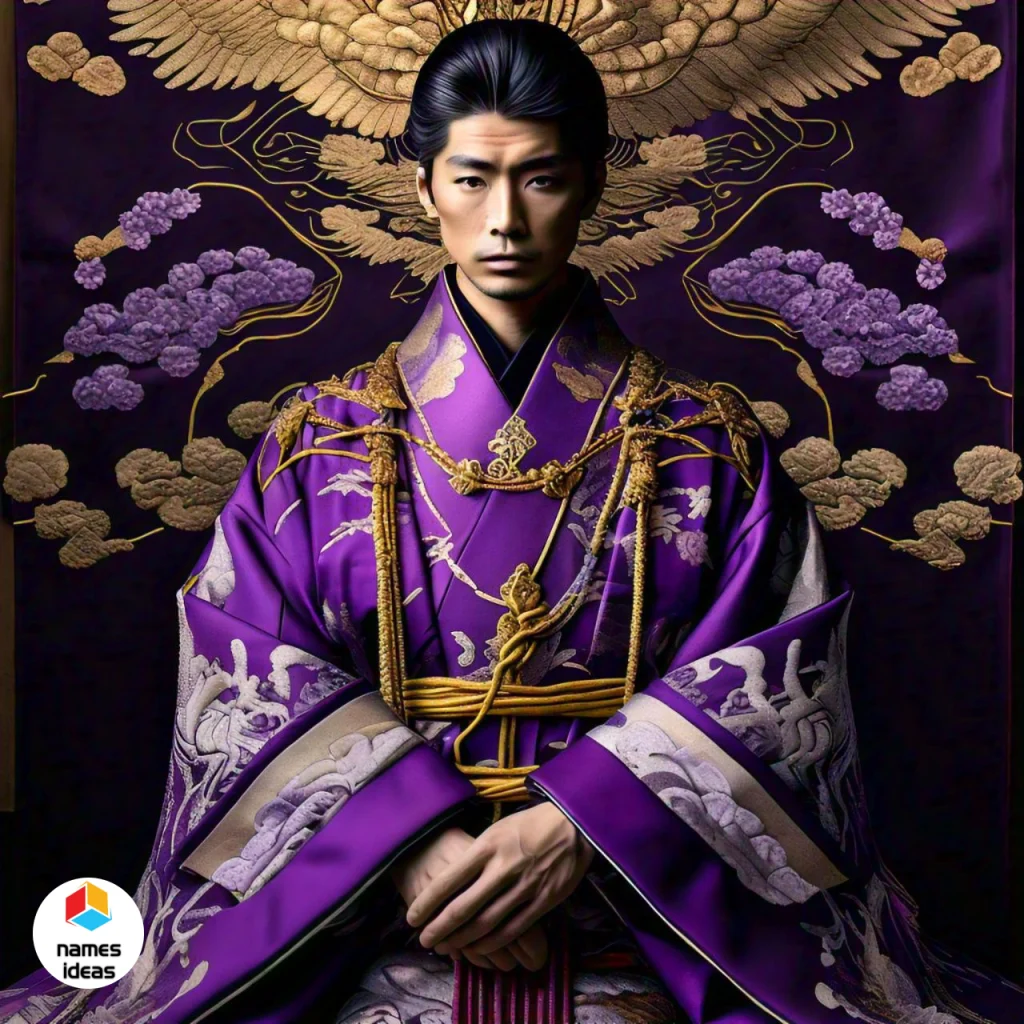
While some names do not directly mean “purple,” Japanese tradition associates them with nature or cultural elements linked to the color purple.
Cool Japanese Names That Mean Purple
- Murasaki (紫) – Directly means “purple.”
- Sumire (菫) – Means “violet,” a flower known for its purple color.
- Shion (紫苑) – Means “aster,” a flower that can be purple.
- Fujiko (藤子) – Means “wisteria child,” inspired by the purple wisteria flower.
- Asagi (浅葱) – Refers to a light shade of blue-green but can be linked with purple hues.
- Aoi (葵) – Means “hollyhock” or “blue,” and can be connected with purple.
- Ruri (瑠璃) – Means “lapis lazuli,” a deep blue stone often associated with purple.
- Kirin (麒麟) – Known as “unicorn” in mythology, sometimes linked with purple symbolism.
- Himawari (向日葵) – Means “sunflower,” which can come in purple varieties.
- Yuri (百合) – Means “lily,” with some varieties being purple.
- Rika (理香) – Linked to the fragrance of purple flowers.
- Shizuka (静) – Means “quiet” or “calm,” with purple often symbolizing serenity.
- Satsuki (五月) – Means “May,” a month when many purple flowers bloom.
- Natsuki (夏希) – Means “summer hope,” which can be associated with purple summer flowers.
- Emi (恵美) – Means “blessed beauty,” with purple often seen as a color of blessings.
- Akemi (明美) – Means “bright beauty,” and purple is linked with both brightness and beauty.
- Rei (麗) – Means “lovely,” and purple is associated with beauty and charm.
- Yoshiko (佳子) – Means “child of beauty,” with purple considered a beautiful color.
- Kiku (菊) – Means “chrysanthemum,” which can be purple.
- Nana (七) – Means “seven,” and purple is often linked with spirituality and depth.
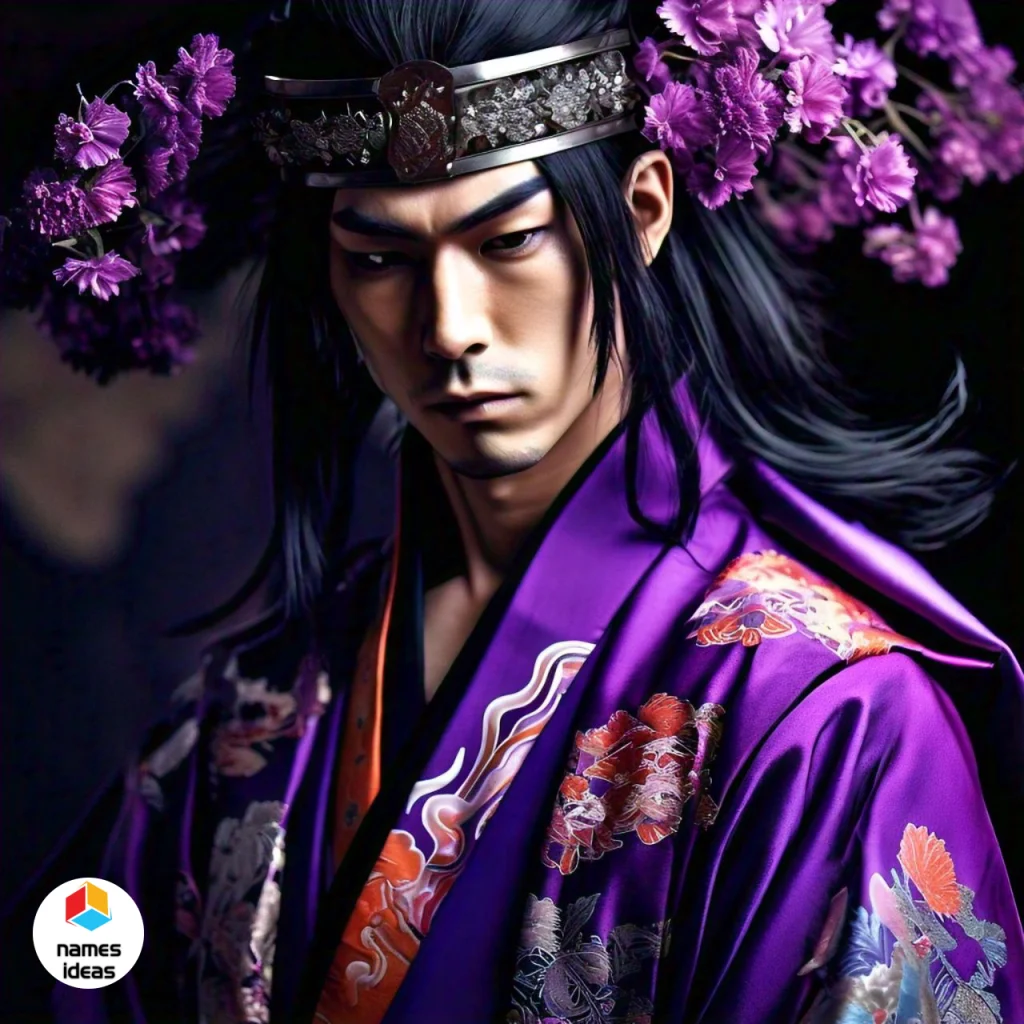
These names blend the elegance and coolness associated with purple, offering both traditional and modern options.
Traditional Japanese Names That Mean Purple
- Murasaki (紫) – Directly means “purple” and is a traditional name.
- Sumire (菫) – Means “violet,” a flower known for its purple color.
- Shion (紫苑) – Means “aster,” a flower that can be purple.
- Fujiko (藤子) – Means “wisteria child,” inspired by the purple wisteria flower.
- Asagi (浅葱) – Refers to a light shade of blue-green but can be linked with purple hues.
- Aoi (葵) – Means “hollyhock” or “blue,” and can be associated with purple tones.
- Ruri (瑠璃) – Means “lapis lazuli,” a deep blue stone with purple hues.
- Yuri (百合) – Means “lily,” with some varieties being purple.
- Kiku (菊) – Means “chrysanthemum,” which can be purple.
- Natsuki (夏希) – Means “summer hope,” and can be associated with purple summer flowers.
- Emi (恵美) – Means “blessed beauty,” with purple often seen as a color of blessings.
- Akemi (明美) – Means “bright beauty,” and purple is linked with beauty.
- Rei (麗) – Means “lovely,” and purple is associated with charm.
- Yoshiko (佳子) – Means “child of beauty,” with purple considered beautiful.
- Miyabi (雅) – Means “elegance,” and purple is linked with sophistication.
- Satsuki (五月) – Means “May,” when many purple flowers bloom.
- Naoko (尚子) – Means “child of esteem,” with purple symbolizing high regard.
- Mariko (真理子) – Means “child of truth,” with purple linked to deep truths.
- Hikari (光) – Means “light,” with purple symbolizing unique radiance.
- Miki (美樹) – Means “beautiful tree,” with purple connecting to natural beauty.
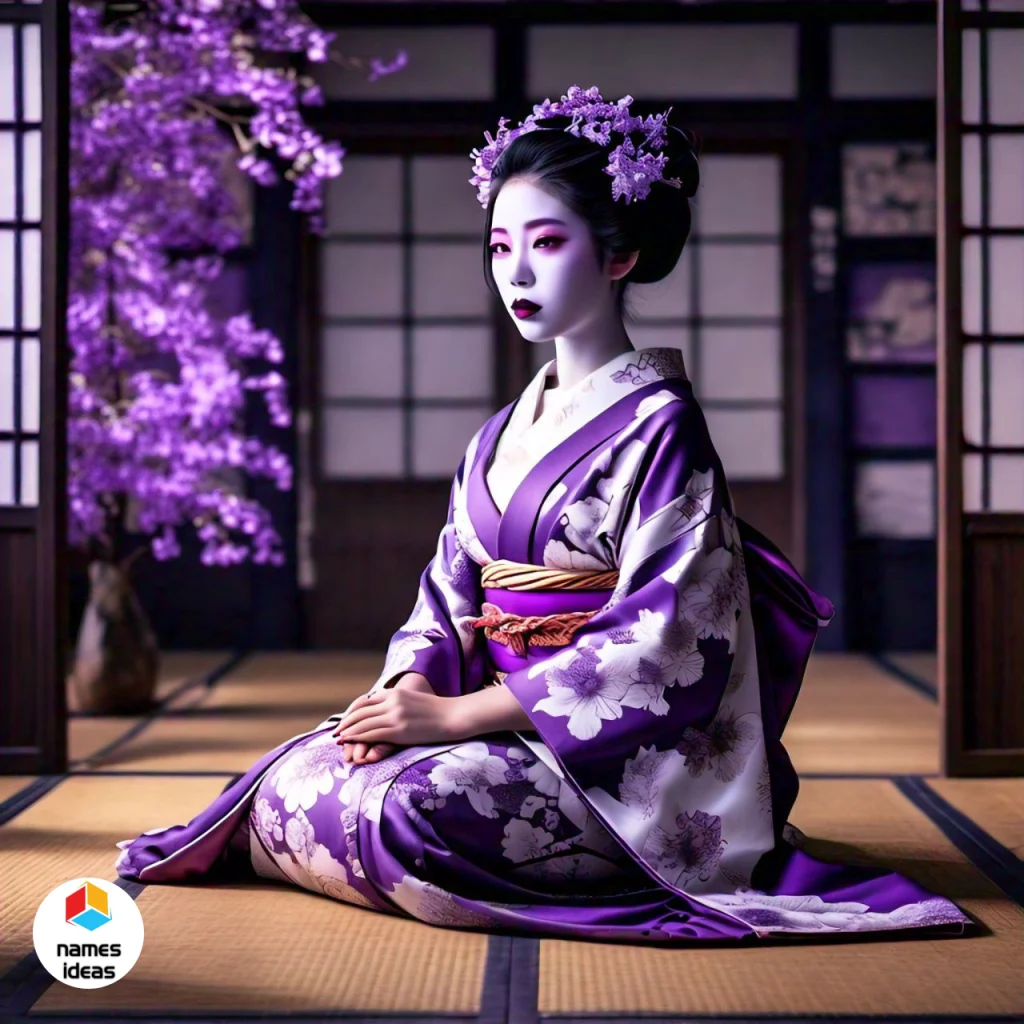
These names, rooted in traditional Japanese culture, carry the elegance and depth associated with the color purple.
Funny Japanese Names That Mean Purple
- Murasaki-chan (紫ちゃん) – A playful take on “Murasaki,” meaning “purple.”
- Sumireko (菫子) – A cute variation of “Sumire,” meaning “violet.”
- Shionko (紫苑子) – Adds a playful suffix to “Shion,” meaning “aster.”
- Fujiko-chan (藤子ちゃん) – A fun twist on “Fujiko,” inspired by the wisteria flower.
- Aoi-tan (葵たん) – A cute way to refer to “Aoi,” meaning “hollyhock.”
- Ruriko (瑠璃子) – A playful form of “Ruri,” meaning “lapis lazuli.”
- Yurikichi (百合吉) – A whimsical take on “Yuri,” meaning “lily.”
- Kikuchi-chan (菊池ちゃん) – A fun variation of “Kikuchi,” meaning “chrysanthemum.”
- Natsuko-nyan (夏子にゃん) – A humorous twist on “Natsuki,” meaning “summer hope.”
- Emiko-chan (恵美子ちゃん) – A cute form of “Emi,” meaning “blessed beauty.”
- Akemi-pon (明美ぽん) – A playful version of “Akemi,” meaning “bright beauty.”
- Reiko-nyan (麗子にゃん) – A funny variation of “Rei,” meaning “lovely.”
- Yoshiko-tan (佳子たん) – A playful version of “Yoshiko,” meaning “child of beauty.”
- Miyabi-chan (雅ちゃん) – A fun twist on “Miyabi,” meaning “elegance.”
- Satsuki-pon (五月ぽん) – A whimsical take on “Satsuki,” meaning “May.”
- Naoko-tan (尚子たん) – A cute variation of “Naoko,” meaning “child of esteem.”
- Mariko-nyan (真理子にゃん) – A playful form of “Mariko,” meaning “child of truth.”
- Hikari-tan (光たん) – A funny version of “Hikari,” meaning “light.”
- Miki-pon (美樹ぽん) – A whimsical take on “Miki,” meaning “beautiful tree.”
- Shizuka-chan (静ちゃん) – A playful form of “Shizuka,” meaning “quiet” or “calm.”
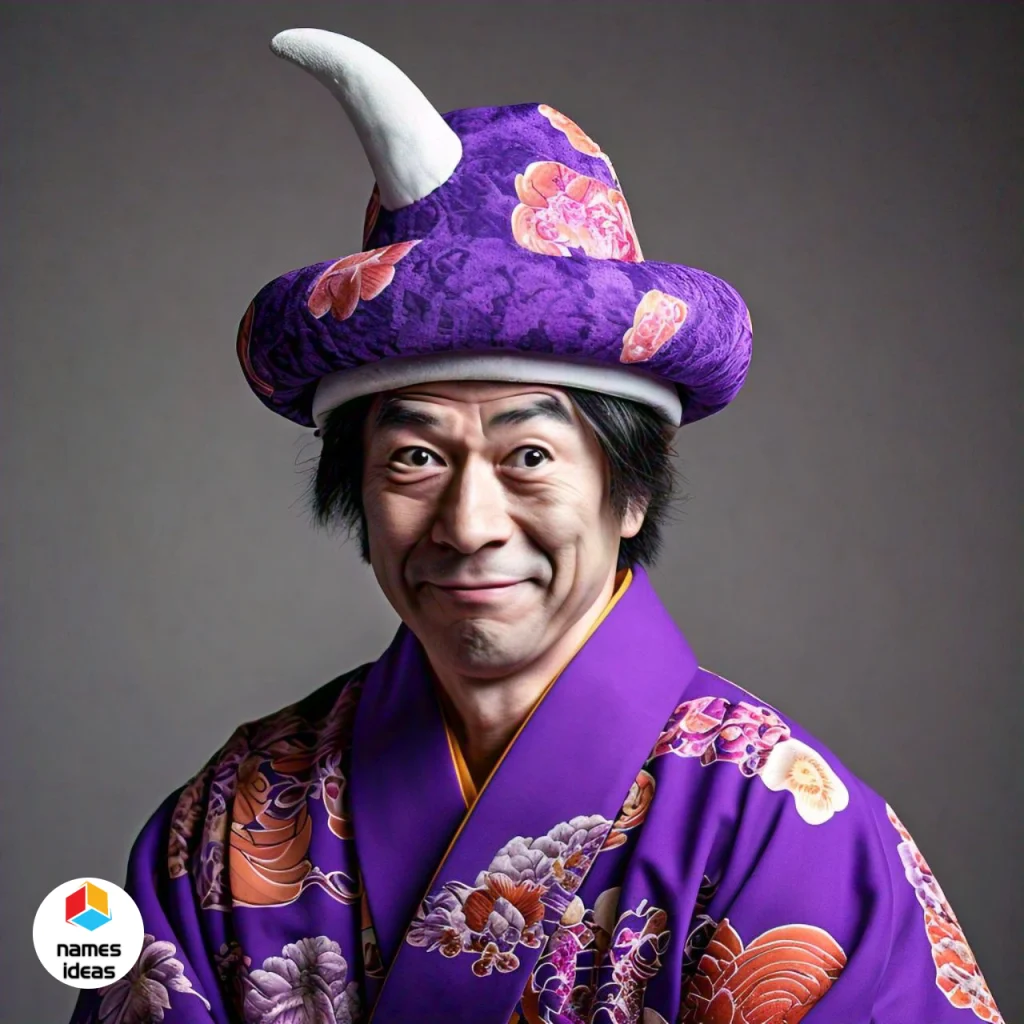
These names infuse traditional meanings with a lighthearted twist, making them memorable and fun.
Creative Japanese Names That Mean Purple
- Murasaki (紫) – Directly means “purple,” and is a classic choice.
- Sumire (菫) – Means “violet,” a flower with a purple hue.
- Shion (紫苑) – Means “aster,” a flower that can be purple.
- Fujiko (藤子) – Means “wisteria child,” inspired by the purple wisteria flower.
- Asagi (浅葱) – Refers to a shade of blue-green, creatively linked with purple.
- Aoi (葵) – Means “hollyhock,” which can be associated with purple in some varieties.
- Ruri (瑠璃) – Means “lapis lazuli,” a gem with purple undertones.
- Yuri (百合) – Means “lily,” with some varieties being purple.
- Kiku (菊) – Means “chrysanthemum,” which can come in purple.
- Natsuki (夏希) – Means “summer hope,” and can be linked with purple summer flowers.
- Emi (恵美) – Means “blessed beauty,” with purple often seen as a color of blessings.
- Akemi (明美) – Means “bright beauty,” and purple is linked with beauty.
- Rei (麗) – Means “lovely,” and purple is associated with charm.
- Yoshiko (佳子) – Means “child of beauty,” with purple considered beautiful.
- Miyabi (雅) – Means “elegance,” and purple is linked with sophistication.
- Satsuki (五月) – Means “May,” when many purple flowers bloom.
- Naoko (尚子) – Means “child of esteem,” with purple symbolizing high regard.
- Mariko (真理子) – Means “child of truth,” with purple linked to deep truths.
- Hikari (光) – Means “light,” with purple symbolizing unique radiance.
- Miki (美樹) – Means “beautiful tree,” with purple connecting to natural beauty.
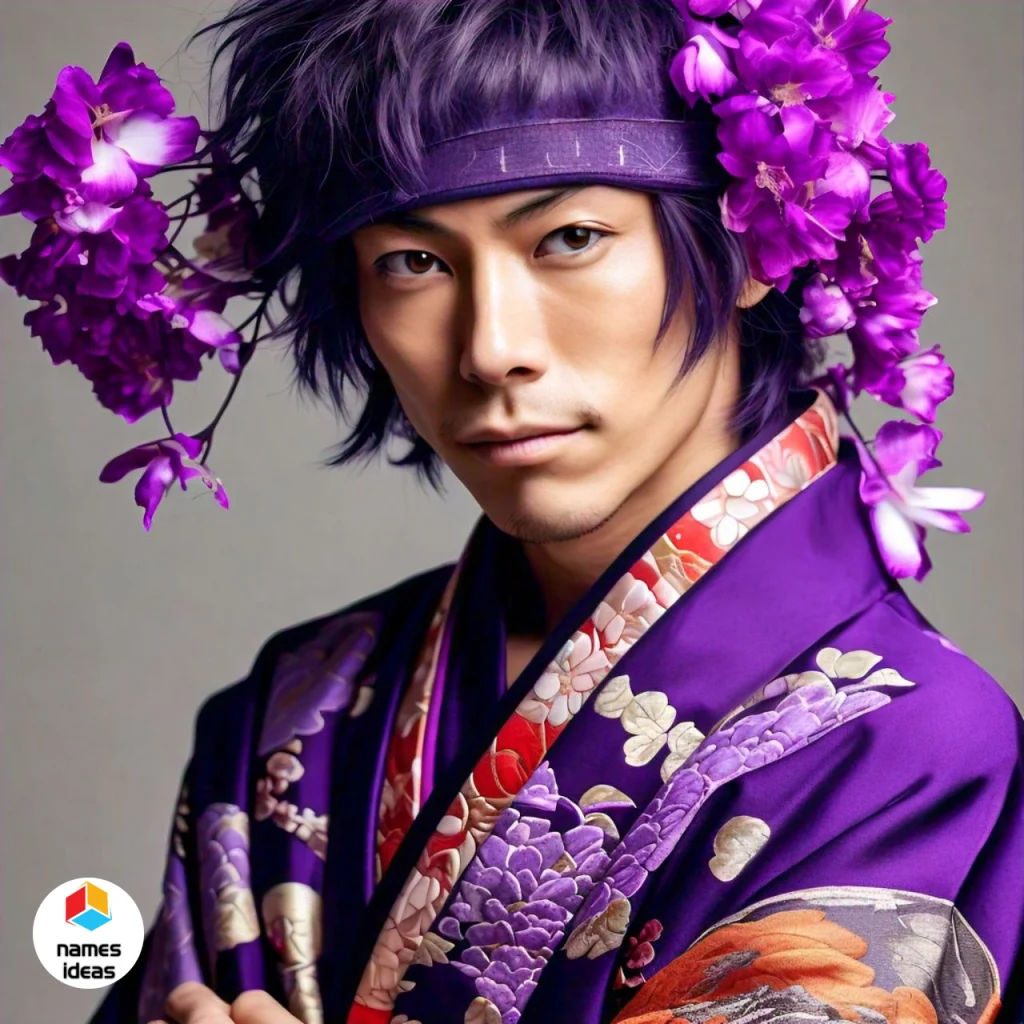
These names creatively incorporate the essence of purple, blending traditional meanings with imaginative elements to create a unique and memorable choice.
Catchy Japanese Names That Mean Purple
- Murasaki (紫) – Directly means “purple,” and is both traditional and catchy.
- Sumire (菫) – Means “violet,” a flower known for its vivid purple color.
- Shion (紫苑) – Means “aster,” a flower that can be purple.
- Fujiko (藤子) – Means “wisteria child,” inspired by the beautiful purple wisteria flower.
- Aoi (葵) – While primarily meaning “hollyhock” or “blue,” it can also be associated with purple.
- Ruri (瑠璃) – Means “lapis lazuli,” a gem with a deep, purple-blue hue.
- Yuri (百合) – Means “lily,” which can come in purple varieties.
- Kiku (菊) – Means “chrysanthemum,” a flower that can be purple.
- Emi (恵美) – Means “blessed beauty,” with purple often seen as a color of blessings.
- Akemi (明美) – Means “bright beauty,” with purple linking to beauty.
- Rei (麗) – Means “lovely,” and purple is associated with charm.
- Yoshiko (佳子) – Means “child of beauty,” and purple is considered beautiful.
- Miyabi (雅) – Means “elegance,” and purple is linked with sophistication.
- Satsuki (五月) – Means “May,” when many purple flowers bloom.
- Naoko (尚子) – Means “child of esteem,” with purple symbolizing high regard.
- Mariko (真理子) – Means “child of truth,” with purple linked to deep truths.
- Hikari (光) – Means “light,” and purple can symbolize unique radiance.
- Miki (美樹) – Means “beautiful tree,” with purple connecting to natural beauty.
- Shizuka (静) – Means “quiet” or “calm,” qualities associated with purple’s serenity.
- Kiyomi (清美) – Means “pure beauty,” with purple sometimes representing purity.
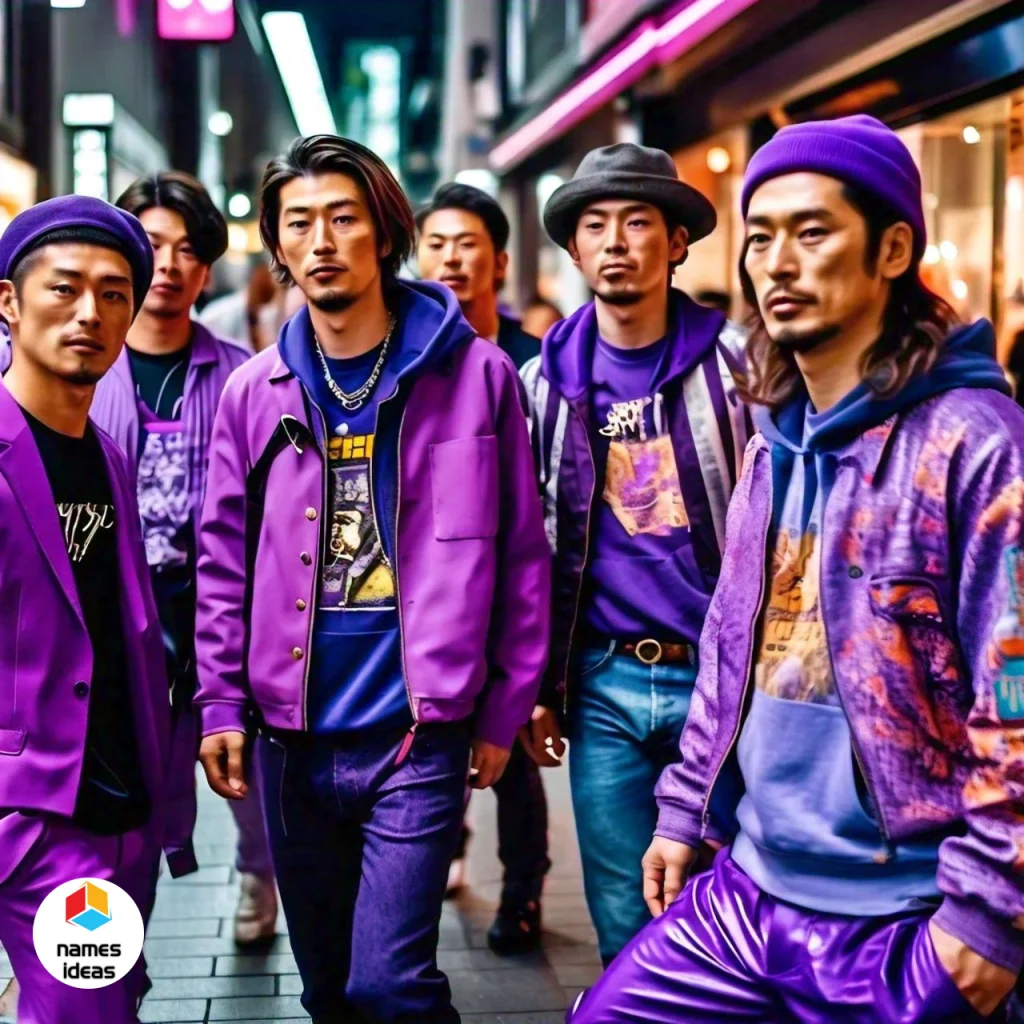
These names blend the essence of purple with engaging and memorable qualities, making them both meaningful and catchy.
Famous Japanese Names That Mean Purple
- Murasaki (紫) – Directly means “purple” and is a well-known name.
- Sumire (菫) – Means “violet,” a popular name for the purple flower.
- Shion (紫苑) – Means “aster,” a flower that can be purple and is used in various cultural contexts.
- Fujiko (藤子) – Means “wisteria child,” inspired by the purple wisteria flower.
- Aoi (葵) – While it means “hollyhock” or “blue,” it is often associated with purple tones in some contexts.
- Ruri (瑠璃) – Means “lapis lazuli,” a gemstone with blue and purple hues.
- Yuri (百合) – Means “lily,” with some varieties being purple.
- Kiku (菊) – Means “chrysanthemum,” a flower that can be purple and has cultural significance.
- Emi (恵美) – Means “blessed beauty,” with purple often seen as a color of blessings.
- Akemi (明美) – Means “bright beauty,” and purple is often associated with beauty.
- Rei (麗) – Means “lovely,” and purple is linked with charm and elegance.
- Yoshiko (佳子) – Means “child of beauty,” with purple considered a beautiful color.
- Miyabi (雅) – Means “elegance,” and purple is connected with sophistication.
- Satsuki (五月) – Means “May,” the month known for blooming purple flowers.
- Naoko (尚子) – Means “child of esteem,” with purple symbolizing high regard.
- Mariko (真理子) – Means “child of truth,” with purple linked to deep truths.
- Hikari (光) – Means “light,” and purple can symbolize unique radiance.
- Miki (美樹) – Means “beautiful tree,” with purple connecting to natural beauty.
- Shizuka (静) – Means “quiet” or “calm,” qualities associated with purple’s serenity.
- Kiyomi (清美) – Means “pure beauty,” with purple sometimes representing purity.
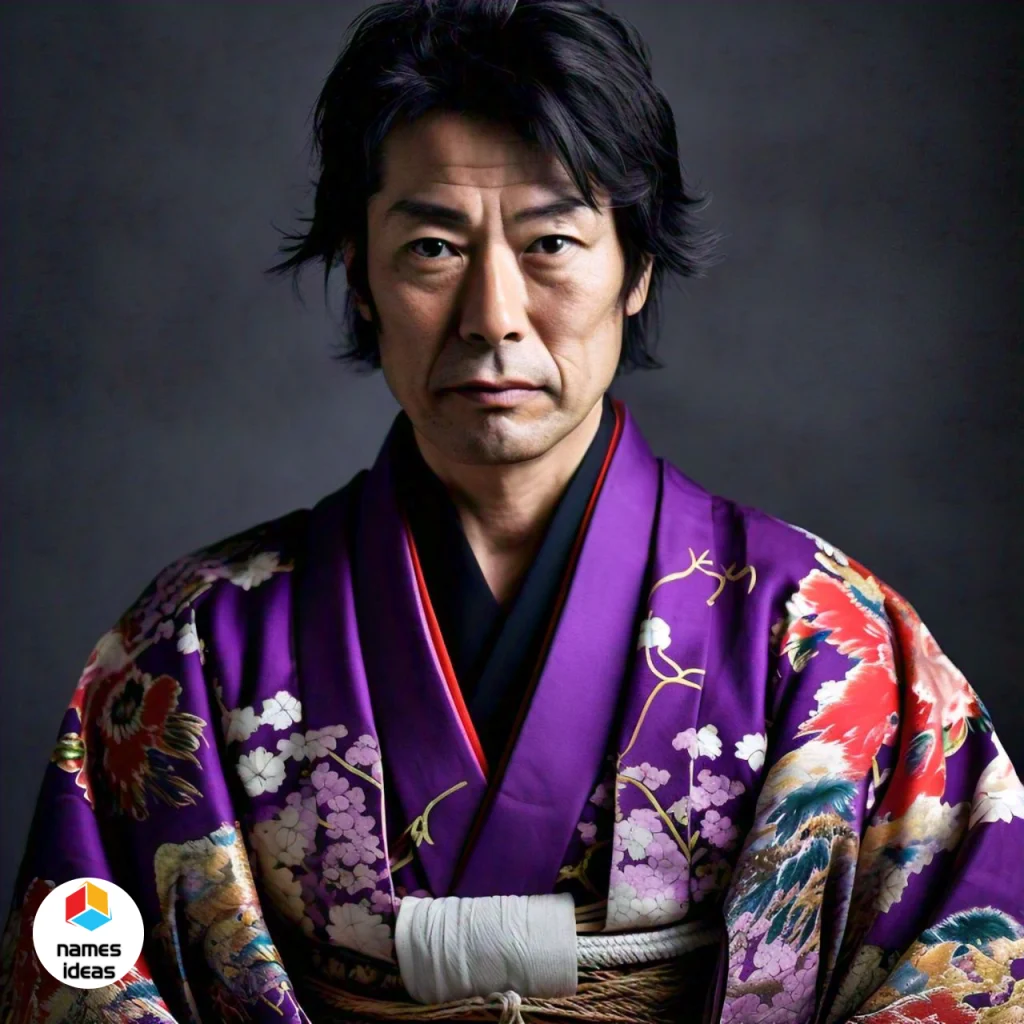
These names include both traditional and contemporary options, reflecting the cultural and aesthetic significance of the color purple in Japanese naming conventions.
Unique Japanese Names That Mean Purple
- Murasaki (紫) – Directly means “purple,” and is a classic, unique name.
- Sumire (菫) – Means “violet,” a flower with a distinct purple hue.
- Shion (紫苑) – Means “aster,” a flower that can be purple.
- Fujiko (藤子) – Means “wisteria child,” inspired by the purple wisteria flower.
- Asagi (浅葱) – Refers to a light shade of blue-green, creatively linked with purple.
- Ruri (瑠璃) – Means “lapis lazuli,” a gem with deep blue and purple tones.
- Yuri (百合) – Means “lily,” with some varieties being purple.
- Kiku (菊) – Means “chrysanthemum,” a flower that can be purple.
- Emi (恵美) – Means “blessed beauty,” with purple seen as a color of blessings.
- Akemi (明美) – Means “bright beauty,” with purple linking to beauty.
- Rei (麗) – Means “lovely,” and purple is associated with charm and elegance.
- Yoshiko (佳子) – Means “child of beauty,” and purple is considered beautiful.
- Miyabi (雅) – Means “elegance,” and purple is connected with sophistication.
- Satsuki (五月) – Means “May,” the month when many purple flowers bloom.
- Naoko (尚子) – Means “child of esteem,” with purple symbolizing high regard.
- Mariko (真理子) – Means “child of truth,” with purple linked to deep truths.
- Hikari (光) – Means “light,” and purple can symbolize unique radiance.
- Miki (美樹) – Means “beautiful tree,” with purple connecting to natural beauty.
- Shizuka (静) – Means “quiet” or “calm,” qualities associated with purple’s serenity.
- Kiyomi (清美) – Means “pure beauty,” with purple sometimes representing purity.
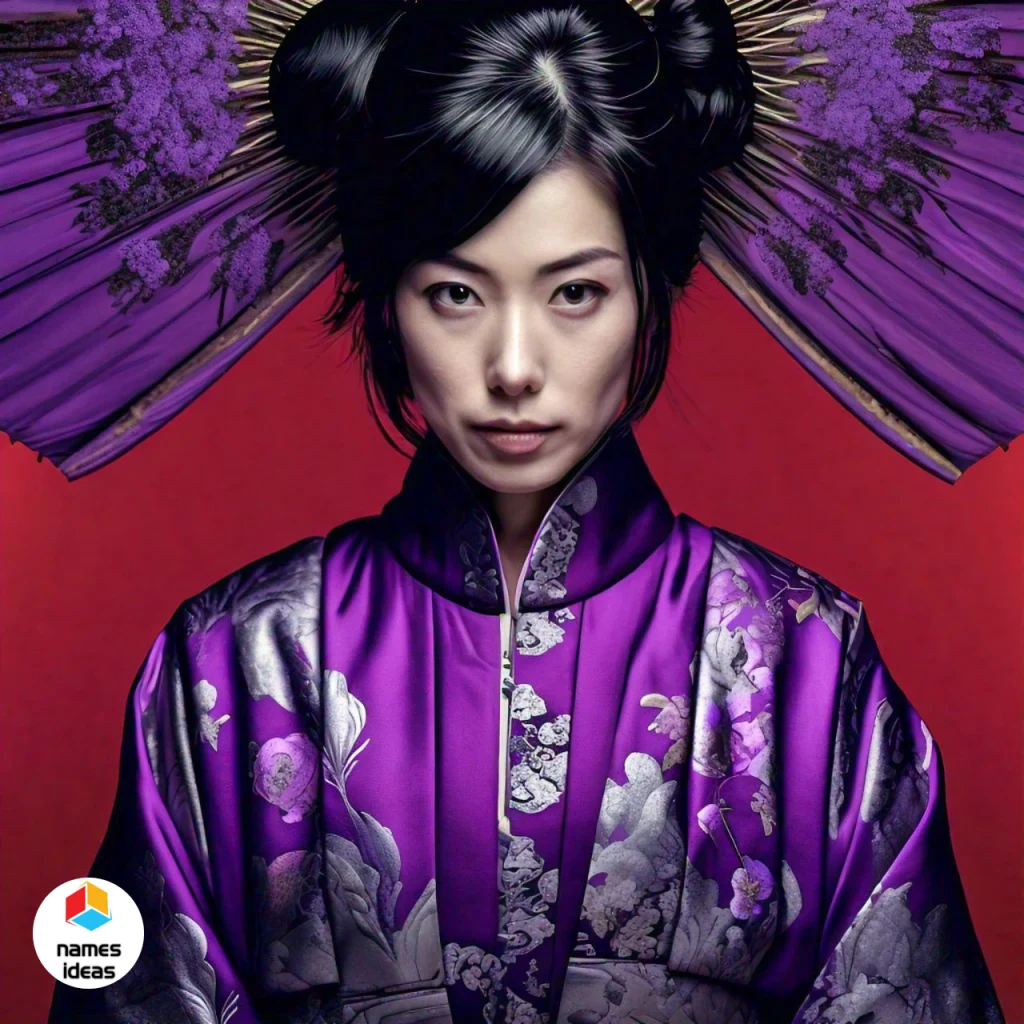
These names offer a range of unique options, each with a connection to the color purple or its symbolic meanings.
Cute Japanese Names That Mean Purple
- Murasaki-chan (紫ちゃん) – A cute variation of “Murasaki,” meaning “purple.”
- Sumireko (菫子) – A playful version of “Sumire,” meaning “violet.”
- Shion-chan (紫苑ちゃん) – A sweet take on “Shion,” meaning “aster.”
- Fujiko-chan (藤子ちゃん) – A charming form of “Fujiko,” inspired by the wisteria flower.
- Aoi-tan (葵たん) – A cute variation of “Aoi,” meaning “hollyhock,” often associated with purple tones.
- Ruriko (瑠璃子) – A whimsical form of “Ruri,” meaning “lapis lazuli.”
- Yuriko (百合子) – A cute version of “Yuri,” meaning “lily.”
- Kikuko (菊子) – A playful form of “Kiku,” meaning “chrysanthemum.”
- Emiko-nyan (恵美子にゃん) – A cute take on “Emi,” meaning “blessed beauty.”
- Akemi-tan (明美たん) – A sweet version of “Akemi,” meaning “bright beauty.”
- Reiko-chan (麗子ちゃん) – A charming variation of “Rei,” meaning “lovely.”
- Yoshiko-tan (佳子たん) – A cute form of “Yoshiko,” meaning “child of beauty.”
- Miyabi-chan (雅ちゃん) – A playful take on “Miyabi,” meaning “elegance.”
- Satsuki-nyan (五月にゃん) – A whimsical version of “Satsuki,” meaning “May.”
- Naoko-chan (尚子ちゃん) – A cute variation of “Naoko,” meaning “child of esteem.”
- Mariko-tan (真理子たん) – A sweet form of “Mariko,” meaning “child of truth.”
- Hikari-tan (光たん) – A playful version of “Hikari,” meaning “light.”
- Miki-chan (美樹ちゃん) – A cute form of “Miki,” meaning “beautiful tree.”
- Shizuka-tan (静たん) – A charming variation of “Shizuka,” meaning “quiet.”
- Kiyomi-nyan (清美にゃん) – A sweet version of “Kiyomi,” meaning “pure beauty.”
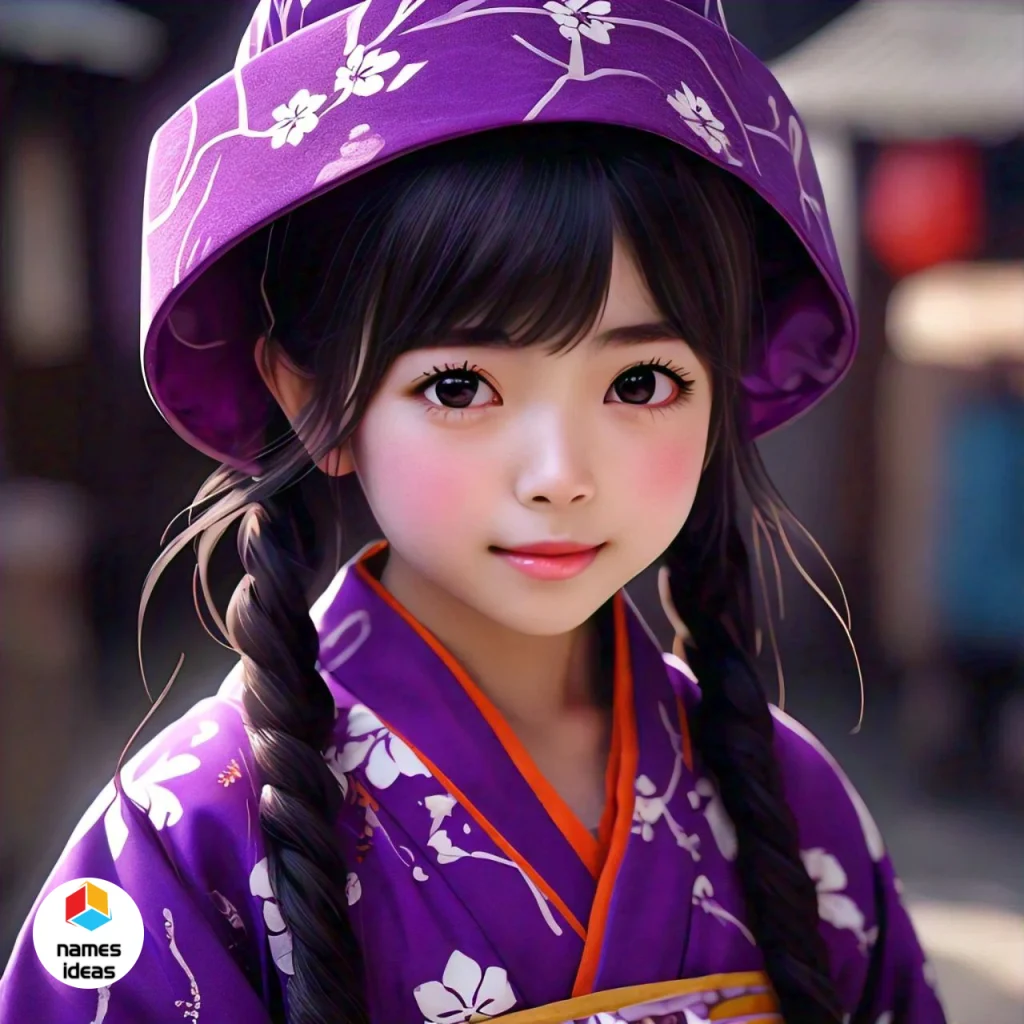
These names combine the essence of purple with adorable and playful elements, making them both endearing and memorable.
Conclusion
Japanese names that mean purple provide a unique and elegant choice for those seeking names with deep cultural significance and beauty. The color purple in Japanese tradition symbolizes nobility, grace, and spirituality, making these names not only beautiful but also meaningful. Whether you’re looking for traditional or modern names, this selection offers a variety of options that reflect the rich symbolism and allure of the color purple.
FAQs
Japanese names that mean purple often symbolize qualities such as elegance, nobility, and spirituality. In Japanese culture, people traditionally associate the color purple with royalty and sophistication.
Yes, several traditional Japanese names link to the color purple. Names like Murasaki and Sumire directly translate to or draw inspiration from purple hues.

